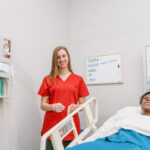Grace College biology and chemistry student Austin Bowell, of Warsaw, Indiana, has partnered with Professor of Chemistry Dr. Andrew Zhou to research alternative electrode materials for safer lithium-ion batteries (LIBs) at a lower cost this summer. The co-curricular project was initiated by Bowell who has set her sights on medical school. The pair meets every Monday and Friday in the newly renovated chemistry lab in the Grace College Dane A. Miller Science Complex.
“It’s not every day that a student takes it upon themselves to initiate a learning experience that does not earn them any credit,” said Zhou. “It’s evident that Austin has a passion for thoughtful scholarship and a genuine desire to prepare for her career,” he said.
As Bowell wrapped up her sophomore year, she began brainstorming how she could bolster her research experience and gain exposure to the world of academic publishing. She knew that having independent research experience would prepare her for graduate school and give her a competitive edge. Bowell approached Zhou about helping her reach her goal.
“I knew that Dr. Zhou had more than 20 years of experience with research and about 10 years of experience specifically with batteries. I figured that this could be an opportunity to learn from his expertise,” said Bowell.
Since May, Bowell and Zhou have been researching copper-based battery electrode materials to develop aqueous LIBs which can help lower the cost. While natural reserves of cobalt, manganese and iron keep decreasing, the demand for LIBs continues to increase.
This research is also very important for solving safety problems, such as Teslas catching on fire as seen in the news, because the widely used flammable organic solvents are replaced by non-flammable water in aqueous LIBs. Furthermore, they are specifically evaluating how a state-of-the-art technique called atomic layer coating (available via collaboration) can increase battery efficiency.
“Battery chemistry is a very, very tricky yet interesting thing,” said Zhou. “This research is so important because it is exceedingly relevant. Everything uses batteries,” he added.
Through Bowell’s hands-on experience, she has found that the research process is not always easy.
“There has been so much work that has gone into developing precise fabrication and testing methods to ensure accurate results. Not only have we been conducting the research, but also building many of the devices we are using from scratch such as the electrode testing cell,” said Bowell. “One of my biggest takeaways from the research thus far is the importance of using best practices to make sure the research is done with quality and excellence,” she said.
Zhou and Bowell plan to continue their research through the school year. The research will all be compiled, analyzed, and then submitted to several state and national conferences including the Indiana Academy of Science.In addition to the research project, Bowell is working at KCH Hospital as a patient care technician in the ICU this summer.
“It’s about curiosity. It’s about problem-solving. At the end of the day, the process is so much more important than the paper,” said Zhou. “Austin has a genuine curiosity and desire to learn. This will serve her well in her journey to graduate school and beyond,” he said.
To learn more about the Department of Science and Mathematics at Grace, visit www.grace.edu/academics/undergraduate/academic-schools-departments/sc/department-science-mathematics/.




